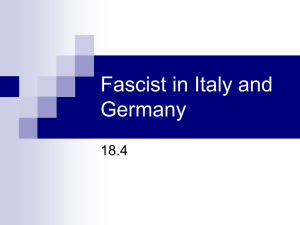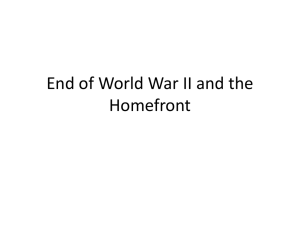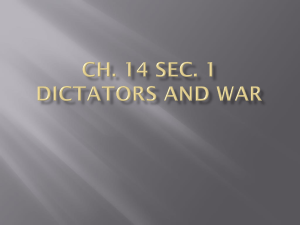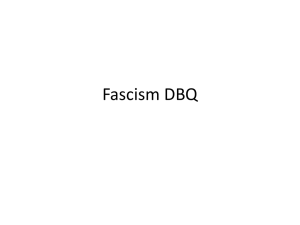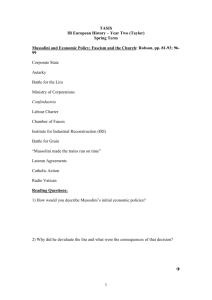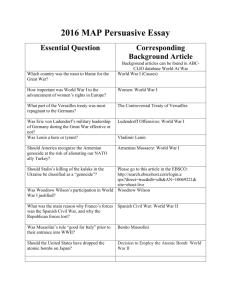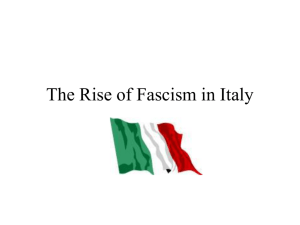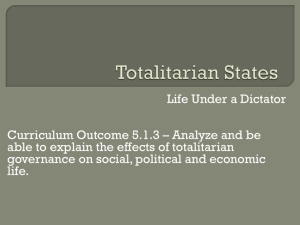PowerPoint
advertisement
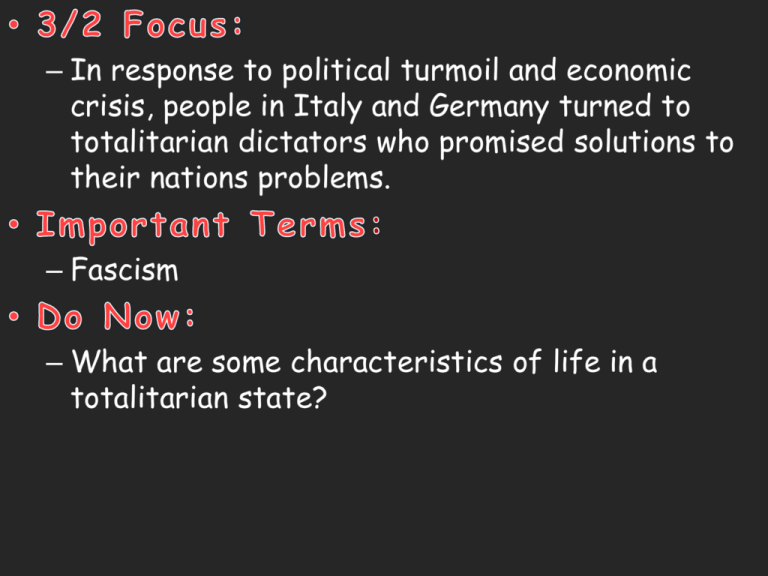
– In response to political turmoil and economic crisis, people in Italy and Germany turned to totalitarian dictators who promised solutions to their nations problems. – Fascism – What are some characteristics of life in a totalitarian state? • Widespread economic hardships caused by Great Depression contributed to the rise of dictators in Europe – People gave power to strong leaders who promised to solve nations problems – Totalitarian dictatorships replaced gov’ts that could not meet their peoples needs • Fascist leaders emerged in the 1920’s-30’s : – Spain – Germany – Italy • A political movement that seeks to establish a dictatorial government that is nationalistic and imperialistic – Promoted extreme form of nationalism – A denial of individual rights • The needs of the state outweigh the needs of the individual – Dictatorial one party rule – were anti-communist • Italy was disappointed by the outcome of the Treaty of Versailles – Had hoped to gain territory • Economic problems after WWI contributed to social unrest – – – – – High inflation High unemployment Trade decreased High taxes Workers strikes led by communists • Many Italians believed democratic government couldn’t solve problems • Benito Mussolini formed the Fascist Party in 1919 – Had the support of many war veterans and dissatisfied Italians • Mussolini promised to strengthen Italy and solve economic problems – Would end unemployment – Gain more territory for Italy – Would outlaw strikes and communist threats • Mussolini and the Fascists gained power in Italy in 1922 – Fascist “Black Shirts” used terror and violence to intimidate opposition – Mussolini was known as Il Duce (the leader) • Mussolini consolidated control of Italy – Ended free elections – Restricted free speech and free press – Killed or jailed political opponents – Controlled economy by allying with industrialists and large landowners • Widespread Use of indoctrination and control of education – Convinced people to put goals of state before individual rights • Mussolini began an aggressive foreign policy – Invaded Ethiopia in 1935 • What is Fascism? • What conditions led many people in Italy to support Mussolini and the Fascist Party? • How did Mussolini consolidate his control over Italy? – Many Germans blamed the Weimer Republic, the new democratic government created in Germany after WWI, for Germany’s defeat in WWI and post war humiliation caused by the Treaty of Versailles . – Inflation – How did did Mussolini gain power in Italy? Strong military Use of fear and violence Blind loyalty to a leader censorship & gov’t control of news Fascism Rule by dictator Extreme nationalism State control of economy Secret police • Many Germans felt that the Treaty of Versailles was unfair and humiliated Germany – German territory taken to create new countries – Forced to pay war reparations – Limited the size of Germany’s military – Took away German colonies • Kaiser Wilhelm stepped down from power in 1919. – Germany was in chaos • Germans created a new democratic government – Known as the Weimar Republic – Germany did not have a tradition of democratic government • Many Germans blamed the Weimar government for accepting the harsh terms of the Treaty of Versailles • Some Germans accused Communists and Jews in Germany of conspiring against Germany during the war • Inflation and unemployment was a major economic problem for Germany after the war – Germany had printed money to pay for expenses of the war rather than tax citizens – German currency became worthless • Ex: A loaf of bread cost less than one German Mark in 1918; A loaf of bread cost 200 billion Marks in 1923 • Worldwide economic depression added to economic difficulties in Germany • Extreme right wing political party that believed that the Treaty of Versailles had to be overturned – Nationalist Socialist Workers Party – German form of fascism – Opposed Communism – Blamed Jews and foreign powers for Germany’s problems – Established a private militia known as the Brown Shirts • Became the leader of the Nazi Party in 1920 – “Der Führer” (The Leader) • Why did many Germans resent the Treaty of Versailles? • Why did many Germans not support the Weimar government?
